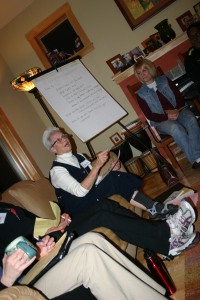Posted by Elizabeth Eilers Sullivan, Visitation Alumna
Monday night I had the joy to talk about vocational discernment (yes we all have a vocation and an invitation to discern it!) in collaboration with Melissa Borgmann-Kiemde, Brigid Ryan-Ling, Sister Katherine Mullin and the many young, authentic adults who joined us at St. Jane House, the Sisters house of Hospitality and Spirituality. What follows is St. Francis de Sales wisdom on discerning the Two Wills of God, given through Sister Katherine’s sage study and guidance. Her talk is an inspiration to draw upon. If you would like to read his original text it can be found in the Treatise of Love by St. Francis de Sales books 8 & 9. Or a summarized version in St. Francis de Sales and St. Jane de Chantal Letters of Spiritual Direction pg 40. (Please note Fd S refers to St. Francis de Sales throughout this outline of unpacking his wisdom.
DISCERNMENT : WHAT FRANCIS DE SALES (FdS) CALLS
THE “TWO WILLS OF GOD” TALK
NOVEMBER 1, 2010
by Sr KatherinePREAMBLE: slight review /reminder of last month’s talk on FdS Method of Discerning: Another way of saying it is:
Discern, Decide and Do (and Do not doubt!)Two Wills of God: One Fd S refers to as Declared Will of God, the other, God’s Permissive Will. One steeps herself/ himself in Commandments, Christian Doctrine and Scripture, forms the conscience and then in real life situations uses good sense and one’s intuition to follow a sacred path.
I. Declared Will of God. FdS, first and foremost in this consideration is to do things with love for God. His writings on the Will Of God is just a small section in his whole treatment called Treatise on the Love of God. The person makes free and loving choices based upon judgments sifted through the sources at our disposal. Fd S goal is to engage us more and more in responding in love to what we know God has asked of us from knowing:
1.Commandments,
2.Christian Doctrine (like the Beautitudes),
3.Scriptures– following who Jesus was and how he fulfilled the law) and
4.carried in the arms of the church community with its storehouse of wisdom, the inspirations given to you– God’s wisdom at work in you.II. Permissive Will of God. While living, one forms a conscience — and then it gets applied in real situations. “God’s Will done”– becomes known through what is. God does not cause what happens, but allows things to occur.
Example: You have heard recently in the news of the pilot, a father of three boys, that their plane that went down (God did not cause this, but permitted it. God gave us free will to decide things, like being a pilot, having children, taking them on the hunting trip). In any case where there is suffering, God does not cause this, but allows it. This tragedy occurs. The family and friends will mourn this passing. The family and friends have this close journey with sorrow, suffering, and an opportunity to enter into this experience. The passive will of God could be realized again as the family or friend is able to witness, empathize or journey with another who likewise experiences such a tragedy or suffering.
Example: The Visitation sisters decided to come to North Minneapolis, even though people said it’s “too dangerous;” if one of us should get killed, say, in cross -fire, God would not be causing it. This example and definition of the passive will of God is grounded in what happens to you and others, it is about the existing realities.
In the face of what is beyond your human control, one exercises the “love of submission,” by aligning oneself graciously to what is, and trusting that God’s providence is ultimately at work.Sometimes it helps me to say the prayer:
“God grant me the serenity to accept the things I can not change, the courage to change the things I can, and the wisdom to know the difference.”What living between the two Wills of God means: Trust your God- given intuitions.
And… Live with some healthy tension, believing that the totality of the Will of God is not found in either the Declared Will of God or the real situations you find yourself in your life. It is a human task to live in the healthy tension of both, which refuses to limit God to one expression or another. Creative tensions are good and in reality we end up stronger within because we live the immense mystery of God whose fullness can’t be contained in the black and white.
Amen.

1 Comment
sr. suzanne homeyer · November 4, 2010 at 8:42 am
i enjoyed this….good summary for folks who can’t get their hands on the treatise, etc. good job, katherine!
sr. suzanne